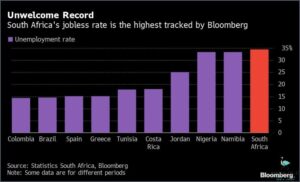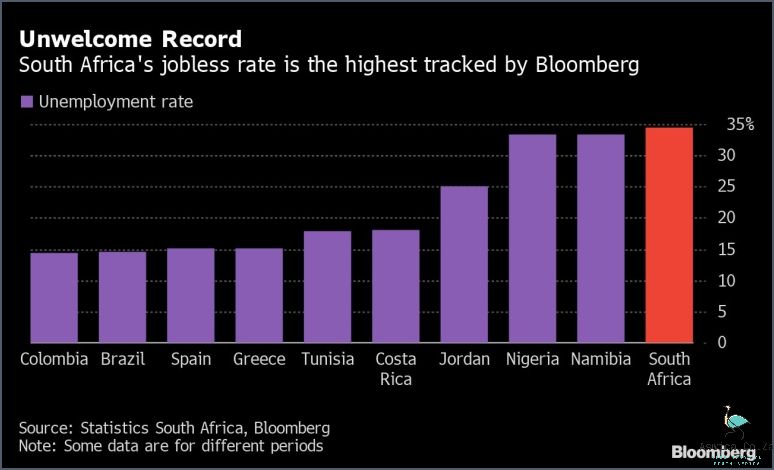
Unemployment in South Africa has been a major issue for many years, with the country’s rate of unemployment reaching as high as 27.2% in 2020. The causes of unemployment in South Africa can be attributed to a number of different factors. These include a lack of economic growth, a lack of economic diversification, structural rigidities in the labor market, a skills mismatch, poverty and inequality, and a lack of investment in education and training.
The lack of economic growth in South Africa has been a major contributor to the country’s high unemployment rate. The country’s economy has failed to grow at a rate that can sufficiently absorb the additional labor supply from the growing number of unemployed people. This is partly due to the lack of economic diversification, which has resulted in the economy being heavily reliant on the mining sector for growth.
Structural rigidities in the South African labor market have also contributed to the country’s unemployment. South Africa’s labor market is characterized by a high degree of inflexibility, which makes it difficult for employers to adjust to changing market conditions. This inflexibility has resulted in a lack of job creation, which in turn has led to an increase in the unemployment rate
Contents
What Is The Causes Of Unemployment In South Africa
South Africa has seen a growing number of unemployed people over the past few years due to a variety of causes. The first cause is the lack of education and training opportunities in the country, which leads to a lack of qualified workers. Another factor is the high rate of poverty, which leaves many unable to afford the costs associated with gaining employment. Moreover, the South African economy has been struggling in recent years, with a lack of investment from both the public and private sectors. This has led to fewer job opportunities, making it difficult for many to find gainful employment. Finally, the country has seen an increase in automation, which has led to many jobs being taken away from the workforce. All of these factors have contributed to the current levels of unemployment in South Africa.
Historical causes of unemployment in South Africa
The causes of unemployment in South Africa are complex and multifaceted. Historically, the country has been plagued by economic, social and political challenges that have had a significant impact on the labour market.
From an economic perspective, the end of Apartheid in the early 1990s ushered in a period of rapid economic transformation. However, this transformation was accompanied by significant job losses. Many of the former Apartheid-era government-owned enterprises were privatized, resulting in large-scale job losses. Additionally, the rapid economic growth of the early 2000s led to an influx of foreign labour, which further reduced employment opportunities for South African citizens.
From a social perspective, the legacy of Apartheid has had a profound impact on the labour market. The segregation policies of the past resulted in a highly unequal society, where access to education and job opportunities were disproportionately skewed in favour of the white population. This has led to a situation where many black South Africans lack the skills and qualifications needed to gain meaningful employment.
Politically, the government has struggled to address the challenges facing the labour market. In the past, the government has implemented policies aimed at promoting job creation, but these have been largely unsuccessful. Additionally, many of the policies implemented have been criticized for being too narrow in scope and not addressing the underlying structural issues that are contributing to unemployment.
Overall, the causes of unemployment in South Africa are complex and deeply rooted in the country’s history. While the government has implemented policies to address the issue, much more needs to be done in order to ensure that all South Africans have access to meaningful employment opportunities.
Current economic and political pressures on the labor market

South Africa is currently facing a multitude of economic and political pressures on its labor market. These pressures have resulted in both a dramatic rise in unemployment and a decrease in job security.
The two main economic pressures on the labor market are the high rate of inflation and rising cost of living. Inflation has eroded the value of the South African Rand, making it difficult for employers to afford higher wages. The rising cost of living has also made it difficult for workers to make ends meet. This has led to an increase in unemployment and job insecurity for workers.
Political pressures have also played a role in the current labor market situation in South Africa. The government has implemented policies that have had a negative impact on the labor market. These include reducing the minimum wage, cutting social services, and reducing employment protection. These policies have had a negative impact on job security, as employers are less likely to hire or retain workers.
Finally, the global economic crisis has had a significant impact on the labor market. As businesses have struggled to survive, they have increasingly sought to reduce costs by cutting jobs. This has also reduced job security, as companies are more reluctant to hire or retain workers.
Overall, South Africa is facing a challenging economic and political environment that has led to an increase in unemployment and a decrease in job security. To address these issues, the government must implement policies that promote job creation, job security, and living wages. At the same time, businesses must commit to investing in their employees and providing quality jobs. By doing so, the country can ensure that its labor market remains strong and resilient.
Education and skills gap in South Africa
The causes of unemployment in South Africa are complex and multidimensional. From the economic and social standpoint, the country is plagued by a wide range of issues, including the lack of educational and skills gaps. This lack of education and skills gaps have a direct effect on the country’s unemployment rate and its ability to create and sustain viable employment opportunities.
One of the primary issues that contribute to the educational and skills gap in South Africa is the lack of access to quality education. The country has a low rate of educational attainment, with only about 15 percent of the population having a secondary or higher level of education. This is largely due to the fact that educational facilities in South Africa, particularly in rural areas, are often inadequate or nonexistent, leaving many unable to access the necessary resources to pursue educational opportunities. Furthermore, many schools are overcrowded and lack the necessary resources to provide quality instruction.
In addition to the lack of educational opportunities, there is also a wide skills gap in South Africa. Many of the available jobs require skills that are not readily available in the country. This includes technical and vocational skills, as well as the ability to work with computers and other digital technologies. This lack of skills leaves many potential employees unable to find work, which further exacerbates the unemployment problem.
Finally, the economic climate in South Africa also contributes to the country’s unemployment rate. The nation’s economy is in a state of flux, with many businesses struggling to stay afloat. This has led to a decrease in job opportunities and a decrease in wages, making it difficult for many to make ends meet. Additionally, the cost of living in South Africa is high, leaving many unable to afford basic necessities.
In order to address the causes of unemployment in South Africa, it is important to focus on the lack of educational and skills gaps. By providing access to quality education and vocational training, the country can begin to reduce its unemployment rate and create a more viable job market. Additionally, the government must work to increase the wages of those in the workforce, as well as address the cost of living in the country in order to create more financial stability for its citizens. With the right policies in place, South Africa can create a more prosperous future for its people.
Conclusion
The unemployment rate in South Africa is unacceptably high, and the government has been slow to address the problem. structural unemployment, which is caused by a mismatch between the skills of the unemployed and the skills required by employers, is a major contributing factor. The rigidities of the labour market, such as the high cost of firing workers and the difficulty of hiring workers with the required skills, also contribute to unemployment. The economic slowdown and the resulting increase in the number of retrenched workers have made the problem worse. The government has implemented a number of programmes to create jobs, but these have not been successful in reducing unemployment.



